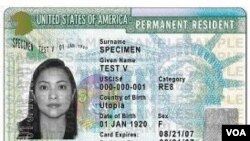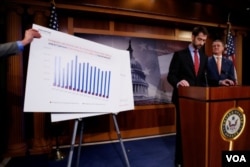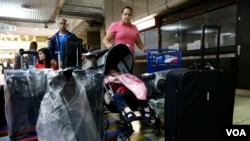Student Union
Will Green Cards Be Cut in Half?

Sure, the likelihood of getting the Diversity Immigrant Visa is slim — about 0.3 percent. But 14 million applicants try to win one of about 50,000 spots in the Green Card lottery each year.
As of early February, though, the diversity visa is once again facing an uncertain future. Republican Senators Tom Cotton of Arkansas and David Perdue of Georgia proposed a bill ending it, in addition to dramatically cutting the number of other legal immigrants and refugees allowed every year.
A similar bill in the House of Representatives narrows the scope, only proposing to end the diversity visa.
The 22-year-old visa lottery has been threatened before in legislation sponsored by Republicans and Democrats as recently as last year. But it never became law.
Now with a Republican-controlled Congress and a president who has focused on immigration, the program is again at risk with the Reforming American Immigration for Strong Employment (RAISE) Act.
In a statement announcing the bill, the senators claimed it will “help raise American workers' wages.”
"We are taking action to fix some of the shortcomings in our legal immigration system," Perdue said. "Returning to our historically normal levels of legal immigration will help improve the quality of American jobs and wages."
Research has shown that the connection between jobs for Americans and immigration is tenuous. But there are other arguments against the lottery program.
For one, the program is susceptible to fraud, both by and against applicants, as the U.S. General Accountability Office found a decade ago.
The State Department improved the application to reduce the number of people who submit multiple applications in the same year, which is an automatic disqualification. Also, it alerts applicants that the lottery is free, and businesses charging a fee to submit lottery applications on applicants' behalf is illegal.
At its core, the diversity lottery was designed — as the name suggests — to diversify the immigrant stream to the U.S. from countries with lower immigration rates. When a country sends more than 50,000 immigrants to the U.S. in five years, they are excluded from the eligibility list.
Natives of Bangladesh, Brazil, Canada, China, Colombia, Dominican Republic, El Salvador, Haiti, India, Jamaica, Mexico, Nigeria, Pakistan, the Philippines, Peru, South Korea, the United Kingdom (excepting Northern Ireland), and Vietnam were excluded from the most recent round of applications.
For applicants who don’t have a family or employer sponsor in the U.S., or who aren’t refugees, the Green Card lottery is the only option.
The lottery is a small portion of immigration to the U.S. every year, but larger than employment-based immigrant visas. In Fiscal Year 2015, the U.S. issued about 48,000 diversity visas out of 531,000 immigrant visas.
Carolien Hardenbol, a diversity visa recipient from the Netherlands, moved to the U.S. in the late 1990s with her husband as new parents with advanced degrees and a sense of adventure. Uncertain they would be sponsored for permanent residency through work, they applied for the diversity lottery — and her husband won.
"I envisioned this big hat where these envelopes were drawn,” she joked.
What started as a volunteer position with Sanctuary for Families, a nonprofit organization in New York that provides legal services to victims of domestic violence and human trafficking, turned into a career for Hardenbol. After getting her legal permanent residency, she became co-director of the Immigration Intervention Project there.
"Without diversity there would be no United States of America," says Hardenbol.
Do fewer immigrants mean more jobs for Americans?
The bill’s announcement follows a series of executive orders by President Donald Trump targeting immigrants, which have been met with lawsuits and protests.
It also reflects the policy suggestions of some groups who want to restrict immigration. Reducing or ending the diversity visa has been a platform for groups who want reduce immigration to the U.S.
The RAISE Act calls for cuts in family preference visas, refugee admissions, and the diversity lottery, while only adding a new W visa, to allow the foreign-born parents of adult U.S. citizens to visit for renewable five-year periods, without a path to citizenship or work approval.
Some immigration supporters say the 50,000 visas could be better used.
Florida-based immigration attorney John Gihon supports ending the diversity lottery, but only in favor of making more family visas available and creating a different opportunity for highly trained immigrants.
“People with degrees in STEM subjects, medicine, nursing, etc, that we know will provide them with an opportunity to find work and contribute to the country should not be denied the green cards simply because there is currently no employer to sponsor them and give them a job,” says Gihon.
Tekleab Elos Hailu applied a few times before winning the lottery. The father of three is a native of Eritrea; his wife is Ethiopian. They applied for the lottery while he was on a graduate scholarship in the United Kingdom, following a conflict between their home countries in the late 1990s.
His first job in the U.S. was working security at a rental car company, though he eventually returned to academia, researching the experiences of fellow diversity lottery recipients and finishing his doctorate. He now works at a community college in Colorado.
Because of the education or work experience required by the lottery, and the needs to be able to apply - like access to the internet and the funds to pay for the eventual green card fees, health screening, and travel - he believes diversity immigrants generally come from relatively well-off positions in their home countries, and as such are a net positive for the U.S.
“They sacrifice what they have had in their own countries, just to bring to change for their children,” says Hailu. “On the other hand, the United States gains from people who have been educated, without spending any money on these people. So why would you [cut it]?”
The RAISE Act has been referred to the Senate Judiciary Committee for review.
Follow legislative actions on S. 354 here here and H.R.1178 - SAFE for America Act here.
This story was first reported in VOANews.com. Do you have or want a Green Card? Please leave a comment here, and visit us on Facebook, Twitter, Instagram and LinkedIn, thanks!
See all News Updates of the Day
- By VOA News
Competition grows for international students eyeing Yale

It’s tough to gain admission to Yale University, and it’s getting even tougher for international students as standout students from around the world set their sights on Yale.
The Yale Dale News, the campus newspaper, takes a look at the situation here.
- By VOA News
Student from Ethiopia says Whitman College culture made it easy to settle in

Ruth Chane, a computer science major from Ethiopia, writes about her experiences settling into student life at Whitman College in the U.S. state of Washington.
"The community at Whitman College made sure I felt welcomed even before I stepped foot on campus," she says.
- By VOA News
Claremont Colleges student gets a shock when she heads home to Shanghai

In The Student Life, the student newspaper for the Claremont Colleges, a consortium of five liberal art colleges and two graduate schools in Claremont, California, student Rochelle Lu writes about readjusting to her Shanghai home after spending a semester in the United States.
- By VOA News
Cedarville University aims to ease transition for international students

Cedarville University in the U.S. state of Ohio says it’s got more than 140 international students representing 44 countries.
Here, the school interviews Jonathan Sutton, director of international student services. He talks about his job and the opportunities for international students on campus.
- By VOA News
Morehouse College offers prospective students tips on applying and thriving

Morehouse College, a private, historically Black liberal arts college in the U.S. state of Georgia, offers a guide for international students interested in attending the school.
Among the tips to apply and thrive at Morehouse:
- Take advantage of the school’s orientation program
- Turn to the school’s Center for Academic Success for tutoring, support and more
- Immerse yourself in campus life via clubs and societies
- By Reuters
US reviews Columbia University contracts, grants over antisemitism allegations

The administration of President Donald Trump said on Monday it will review Columbia University's federal contracts and grants over allegations of antisemitism, which it says the educational institution has shown inaction in tackling.
Rights advocates note rising antisemitism, Islamophobia and anti-Arab bias since U.S. ally Israel's devastating military assault on Gaza began after Palestinian Hamas militants' deadly October 2023 attack.
The Justice Department said a month ago it formed a task force to fight antisemitism. The U.S. Departments of Health and Education and the General Services Administration jointly made the review announcement on Monday.
"The Federal Government's Task Force to Combat Anti-Semitism is considering Stop Work Orders for $51.4 million in contracts between Columbia University and the Federal Government," the joint statement said.
The agencies said no contracting actions had been taken yet.
"The task force will also conduct a comprehensive review of the more than $5 billion in federal grant commitments to Columbia University."
The agencies did not respond to requests for comment on whether there were similar reviews over allegations of Islamophobia and anti-Arab bias.
Columbia had no immediate comment. It previously said it made efforts to tackle antisemitism.
College protests
Trump has signed an executive order to combat antisemitism and pledged to deport non-citizen college students and others who took part in pro-Palestinian protests.
Columbia was at the center of college protests in which demonstrators demanded an end to U.S. support for Israel due to the humanitarian crisis caused by Israel's assault on Gaza. There were allegations of antisemitism and Islamophobia in protests and counter-protests.
During last summer's demonstrations around the country, classes were canceled, some university administrators resigned and student protesters were suspended and arrested.
While the intensity of protests has decreased in recent months, there were some demonstrations last week in New York after the expulsion of two students at Columbia University-affiliated Barnard College and after New York Governor Kathy Hochul ordered the removal of a Palestinian studies job listing at Hunter College.
A third student at Barnard College has since been expelled, this one related to the occupation of the Hamilton Hall building at Columbia last year.
Canada’s immigration overhaul signals global shift in student migration
From Europe to North America, nations are tightening their immigration policies. Now Canada, long seen as one of the world's most welcoming nations, has introduced sweeping changes affecting international students. The reforms highlight a growing global trend toward more restrictive immigration policies. Arzouma Kompaore reports from Calgary.
Trump administration opens antisemitism inquiries at 5 colleges, including Columbia and Berkeley

The Trump administration is opening new investigations into allegations of antisemitism at five U.S. universities including Columbia and the University of California, Berkeley, the Education Department announced Monday.
It's part of President Donald Trump's promise to take a tougher stance against campus antisemitism and deal out harsher penalties than the Biden administration, which settled a flurry of cases with universities in its final weeks. It comes the same day the Justice Department announced a new task force to root out antisemitism on college campuses.
In an order signed last week, Trump called for aggressive action to fight anti-Jewish bias on campuses, including the deportation of foreign students who have participated in pro-Palestinian protests.
Along with Columbia and Berkeley, the department is now investigating the University of Minnesota, Northwestern University and Portland State University. The cases were opened using the department's power to launch its own civil rights reviews, unlike the majority of investigations, which stem from complaints.
Messages seeking comment were left with all five universities.
A statement from the Education Department criticized colleges for tolerating antisemitism after Hamas' Oct. 7, 2023, attack on Israel and a wave of pro-Palestinian protests that followed. It also criticized the Biden administration for negotiating "toothless" resolutions that failed to hold schools accountable.
"Today, the Department is putting universities, colleges, and K-12 schools on notice: this administration will not tolerate continued institutional indifference to the wellbeing of Jewish students on American campuses," said Craig Trainor, the agency's acting assistant secretary for civil rights.
The department didn't provide details about the inquiries or how it decided which schools are being targeted. Presidents of Columbia and Northwestern were among those called to testify on Capitol Hill last year as Republicans sought accountability for allegations of antisemitism. The hearings contributed to the resignation of multiple university presidents, including Columbia's Minouche Shafik.
An October report from House Republicans accused Columbia of failing to punish pro-Palestinian students who took over a campus building, and it called Northwestern's negotiations with student protesters a "stunning capitulation."
House Republicans applauded the new investigations. Representative Tim Walberg, chair of the Education and Workforce Committee, said he was "glad that we finally have an administration who is taking action to protect Jewish students."
Trump's order also calls for a full review of antisemitism complaints filed with the Education Department since Oct. 7, 2023, including pending and resolved cases from the Biden administration. It encourages the Justice Department to take action to enforce civil rights laws.
Last week's order drew backlash from civil rights groups who said it violated First Amendment rights that protect political speech.
The new task force announced Monday includes the Justice and Education departments along with Health and Human Services.
"The Department takes seriously our responsibility to eradicate this hatred wherever it is found," said Leo Terrell, assistant attorney general for civil rights. "The Task Force to Combat Anti-Semitism is the first step in giving life to President Trump's renewed commitment to ending anti-Semitism in our schools."
- By VOA News
STEM, business top subjects for international students

The Times of India breaks down the most popular subjects for international students to study in the U.S.
STEM and business lead the pack. Read the full story here. (January 2025)
- By VOA News
Safety and visa difficulties among misconceptions about US colleges

U.S. News & World report addresses some of the misconceptions about U.S. colleges and universities, including the difficulty of getting a visa.
Read the full story here. (January 2025)
- By VOA News
Work opportunities help draw international students to US schools

US News & World Report details the three top factors in foreign students' decision to study in the U.S. They include research opportunities and the reputation of U.S. degrees. Read the full story here. (December 2024)
- By VOA News
British student talks about her culture shock in Ohio

A British student who did a year abroad at Bowling Green State University in Ohio talks about adjusting to life in America in a TikTok video, Newsweek magazine reports.
Among the biggest surprises? Portion sizes, jaywalking laws and dorm room beds.
Read the full story here. (December 2024)
- By VOA News
Harvard's Chan School tells international students what to expect

Harvard's T.H. Chan School of Public Health reaches out to international students by detailing the international student experience at the school.
Learn more about housing, life in Boston and more here.
- By Reuters
China unveils plan to build 'strong education nation' by 2035

China issued its first national action plan to build a "strong education nation" by 2035, which it said would help coordinate its education development, improve efficiencies in innovation and build a "strong country."
The plan, issued Sunday by the Communist Party's central committee and the State Council, aims to establish a "high quality education system" with accessibility and quality "among the best in the world."
The announcement was made after data on Friday showed China's population fell for a third consecutive year in 2024, with the number of deaths outpacing a slight increase in births, and experts cautioning that the downturn will worsen in the coming years.
High childcare and education costs have been a key factor for many young Chinese opting out of having children, at a time when many face uncertainty over their job prospects amid sluggish economic growth.
"By 2035, an education power will be built," the official Xinhua news agency said, adding that China would explore gradually expanding the scope of free education, increase "high-quality" undergraduate enrolment, expand postgraduate education, and raise the proportion of doctoral students.
The plan aims to promote "healthy growth and all-round development of students," making sure primary and secondary school students have at least two hours of physical activity daily, to effectively control the myopia, or nearsightedness, and obesity rates.
"Popularizing" mental health education and establishing a national student mental health monitoring and early warning system would also be implemented, it said.
It also aims to narrow the gap between urban and rural areas to improve the operating conditions of small-scale rural schools and improve the care system for children with disabilities and those belonging to agricultural migrant populations.
The plan also aims to steadily increase the supply of kindergarten places and the accessibility of preschool education.
- By VOA News
A look at financial aid options for international graduate students in US

The Open Notebook, a site focusing on educating journalists who cover science, has complied a list of U.S. graduate program financial aid information for international students.







